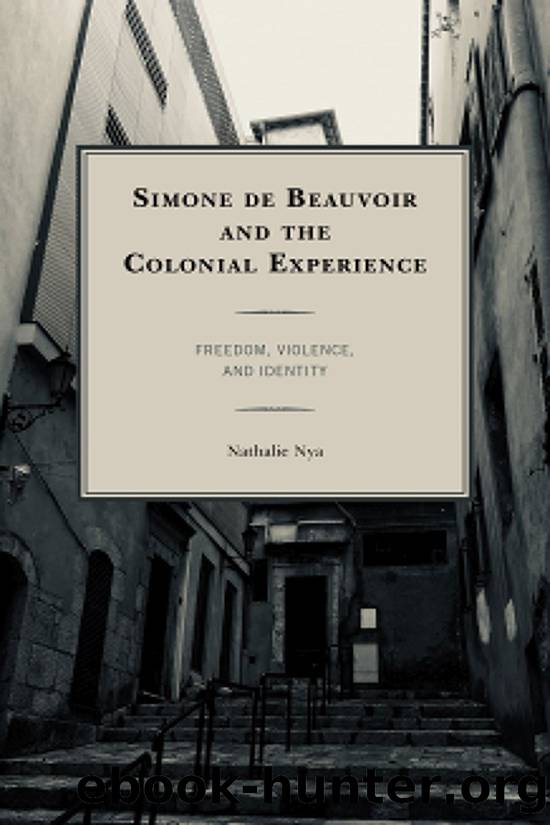Simone De Beauvoir and the Colonial Experience by Nathalie Nya;

Author:Nathalie Nya;
Language: eng
Format: epub
ISBN: 9781498558105
Publisher: Rowman & Littlefield Publishing
Part III
Discourse on Colonialism, Violence, and Racial Identity—Oppression and White Privilege
Chapter 4
Colonial Trends
On Violence
Introducing Beauvoir on Violence
This chapter traces the genealogy of Beauvoir’s conception of colonial violence beginning with her publications on violence from the 1940s. In order to situate Beauvoir’s corpus of work on violence within French colonial philosophy, this chapter starts with a brief interaction between Beauvoir and Fanon. As the chapter progresses, it traces on how the views of Beauvoir and Fanon on violence separate. Fanon’s conception of violence is mostly based on French colonial conflicts and wars, whereas Beauvoir’s analysis of violence focuses on the context of post–World War II France, while including World War II and the Algerian War of Independence. The move to connect but also distinguish Beauvoir’s views on violence from those of Fanon underscores Beauvoir’s importance on the female position within French postcolonial philosophy. This chapter is written in the spirit of Ann V. Murphy’s work on the role of violence in Beauvoirian thought. What I add to Murphy’s article “Between Generosity and Violence” is that Beauvoir’s corpus on violence contributes both to discourses on violence in the French tradition, but also to discourses on violence in French colonial philosophy.1
Fanon on Violence
When Simone de Beauvoir meets Fanon in the early 1960s, right before his death, she observes that although his work is immersed in colonial violence, he had an aversion to violence.2 Of this issue, she specifically reports:
Though an advocate of violence, he was horrified by it; when he described the mutilations inflicted on the Congolese by the Belgians or by the Portuguese on the Angolans—lips pierced and padlocked, faces flattened by palmatorio blows—his expression would betray his anguish; but it did so no less when he talked about the “counter-violence” of the Negroes and the terrible reckonings implied by the Algerian revolution. He attributed this repugnance to his intellectual conditioning; everything he had written against the intellectual has been written against himself as well.3
Beauvoir’s commentary reveals that although Fanon embraced the violence of the colonized during the process of decolonization, he did so with reservation and tribulation. He did not embrace the counter-violence of the Black Africans and revolutionary violence of the Algerians wholeheartedly. Beauvoir reports that Fanon’s personal aversion to violence had to do with his intellectual background. As Beauvoir suggests, as an intellectual, Fanon anticipated the blowback of violence—or counter-violence—believing that it is never used or practiced without releasing negative social and political effects. So even when Fanon considered violence a decolonizing device, he was aware of its repercussions and boomerang effects.
Yet what Beauvoir reports here cannot make us believe, it seems to me, that as a doctor and intellectual participating in the Algerian War of Independence, and as a war veteran of World War II,4 Fanon had cold feet. He was aware, as the analysis of Charif Quellel shows, that to be a revolutionary (i.e., to have the right to convey a message to those fighting for their liberation), one must participate in the revolution.5 Quellel explains why
Download
This site does not store any files on its server. We only index and link to content provided by other sites. Please contact the content providers to delete copyright contents if any and email us, we'll remove relevant links or contents immediately.
The remains of the day by Kazuo Ishiguro(7542)
Tools of Titans by Timothy Ferriss(6936)
The Black Swan by Nassim Nicholas Taleb(6184)
Inner Engineering: A Yogi's Guide to Joy by Sadhguru(5887)
Giovanni's Room by James Baldwin(5872)
The Way of Zen by Alan W. Watts(5790)
The Six Wives Of Henry VIII (WOMEN IN HISTORY) by Fraser Antonia(4784)
The Power of Now: A Guide to Spiritual Enlightenment by Eckhart Tolle(4749)
Astrophysics for People in a Hurry by Neil DeGrasse Tyson(4614)
Asking the Right Questions: A Guide to Critical Thinking by M. Neil Browne & Stuart M. Keeley(4566)
12 Rules for Life by Jordan B. Peterson(3724)
The Ethical Slut by Janet W. Hardy(3494)
Skin in the Game by Nassim Nicholas Taleb(3456)
Housekeeping by Marilynne Robinson(3396)
The Art of Happiness by The Dalai Lama(3378)
Double Down (Diary of a Wimpy Kid Book 11) by Jeff Kinney(3267)
Skin in the Game: Hidden Asymmetries in Daily Life by Nassim Nicholas Taleb(3259)
Walking by Henry David Thoreau(3228)
12 Rules for Life: An Antidote to Chaos by Jordan B. Peterson(3196)
